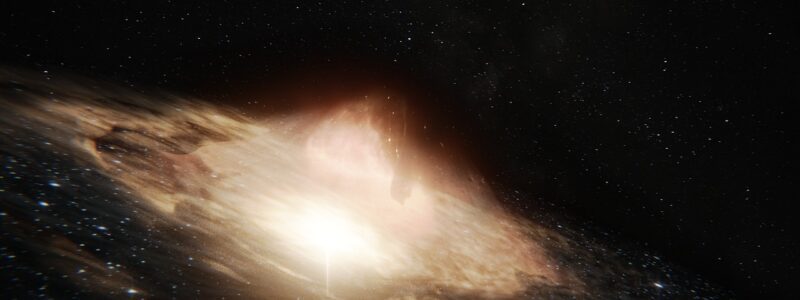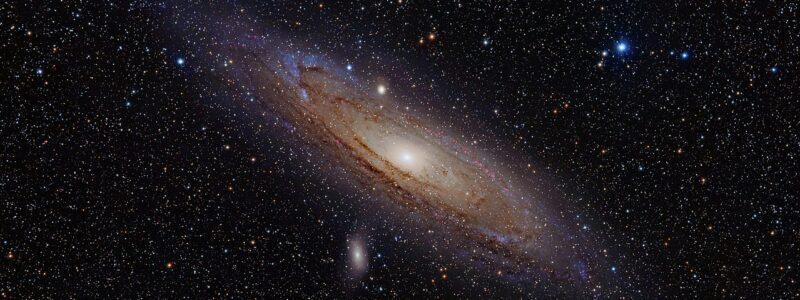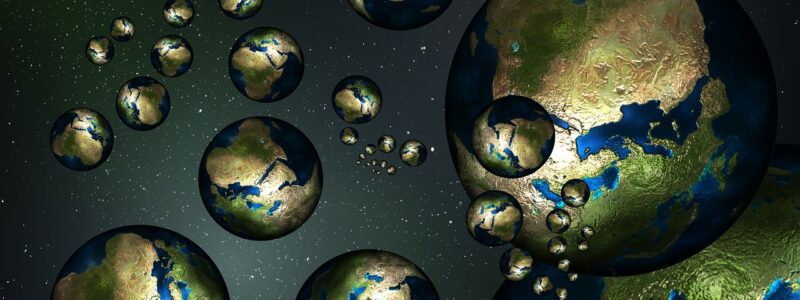Religious Belief

Image by Ondřej Šponiar from Pixabay
Emerging cosmology is consistent with religious belief and not with atheism. That is a remarkable statement only because it is correct.
I have always loved astronomy. While I was in high school, I was President of the Astronomy Club for three years, ground my telescope mirrors, and seriously considered going into astronomy as a career. Religious belief seems to be consistent with emerging new cosmology.
I was the kid who would go to the public library and check out the books on astronomy. I got to the point where I had read all the popular astronomy books written for the public and found I needed to learn much more mathematics to make the rest understandable.
One thing that became clear was the schizophrenic attitude many astronomers have toward religion and science. One the one hand, even very skeptical naturalists can only gasp in awe when looking through a telescope at Jupiter or a distant galaxy.
If there is anything that will suggest religious belief the hardest skeptic, it is the cosmos.
And yet, we know that many cosmologists view the cosmos with a decidedly atheistic eye. They have been taught from youth that science can give no ground to the metaphysical. There are no higher powers than science and mathematics, and Christianity is for the weak-minded.
Dawkins, while not an astronomer, did view believers in a rather condescending manner calling them the Dims while, of course, his crowd of pagans is referred to as the “Brights.” Just let that sink in for a bit.
And of course, we all know that Carl Sagan, the television personality of cosmology, was a hard atheist believing to the end that all would eventually be explainable by the onward march of increasing knowledge.
But is that a universally held opinion?
The Design Inference and Religious Belief

Image by Gerd Altmann from Pixabay
The advance of physics has led to some peculiar discoveries. One of these is that the physical laws of science are precisely set to enable all matter to exist, let alone life.
Any minute division in many of these physical laws of nature from their current values would mean the end of all matter, planets, stars, and of course – life.
But what is even more surprising is there is no need for these values to be what they are; many of them could be any number of other values,
The fact is that many of these values are exquisitely fine-tuned to the extremely narrow variance required for life to exist. Cosmologists became somewhat annoyed when asked about whether there was intelligence behind the apparent intelligent design of nature and astronomy.
Fred Hoyle, one of the more famous astronomers, noted
I do not believe that any scientist who examined the evidence would fail to draw the inference that the laws of nuclear physics have been deliberately designed.
Another famous astronomer had his atheism challenged for religious belief,
The laws [of physics] … seem themselves to be the product of exceedingly ingenious design.
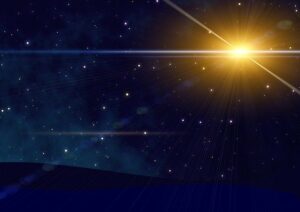
Christmas Star – Image by Gerd Altmann from Pixabay
He further notes,
“[There] is for me powerful evidence that there is ‘something going on’ behind it all. The impression of design is overwhelming.
George Greenstein in his book Symbiotic Universe noted regarding religious belief from cosmology,
As we survey all the evidence, the thought insistently arises that some supernatural agency – or, rather, Agency – must be involved. Is it possible that suddenly, without intending to, we have stumbled upon scientific proof of the existence of a Supreme Being? Was it God who stepped in and so providentially crafted the cosmos for our benefit?
Tony Rothman is a theoretical physicist and popular-level science writer who wrote an article on the so-called Anthropic Principle. This is the idea that the universe that has the characteristics required for the existence of life (particularly for humans and intelligent life), and noted that,
The medieval theologian who gazed at the night sky through the eyes of Aristotle and saw angels moving the spheres in harmony has become the modern cosmologist who gazes at the same sky through the eyes of Einstein and sees the hand of God not in angels but in the constants of nature. … When confronted with the order and beauty of the universe and the strange coincidences of nature, it’s very tempting to take the leap of faith from science into religion. I am sure many physicists want to. I only wish they would admit it.
It is an interesting article coming from a naturalist that the evidence for religious belief is becoming more evident with the passage of years and the accumulation of further knowledge.
The journal Nature – one of the most prestigious journals in existence, published an article from cosmologists Bernard Carr and Martin Rees. They state in their summary,
Nature does exhibit remarkable coincidences and these do warrant some explanation.”
Carr wrote in a later article,
One would have to conclude either that the features of the universe invoked in support of the Anthropic Principle are only coincidences or that the universe was indeed tailor-made for life. I will leave it to the theologians to ascertain the identity of the tailor!
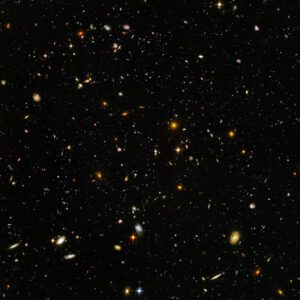
Deep Sky Image showing hundreds of galaxies – By NASA and the European Space Agency. Edited by Noodle snacks – http://hubblesite.org/newscenter/archive/releases/2004/07/image/a/warn/, Public Domain, Link
Freeman Dyson suggests a religious belief when he wrote as a conclusion in one of his books,
The problem here is to try to formulate some statement of the ultimate purpose of the universe. In other words, the problem is to read the mind of God.
And,
I do not feel like an alien in this universe. The more I examine the universe and study the details of its architecture, the more evidence I find that the universe in some sense must have known that we were coming
Vera Kistiakowsky who is professor emerita at MIT and past president of the Association of Women in Science noted regarding religious belief,
The exquisite order displayed by our scientific understanding of the physical world calls for the divine.
Arno Penzias who shared the Nobel Prize for Physics for the discovery of the cosmic background radiation noted,
Astronomy leads us to a unique event, a universe which was created out of nothing, one with the very delicate balance needed to provide exactly the conditions required to permit life, and one which has an underlying (one might say “supernatural”) plan.
Alexander Polyakov, a theoretical physicist and a fellow at Moscow’s Landau Institute noted,
We know that nature is described by the best of all possible mathematics because God created it. So there is a chance that the best of all possible mathematics will be created out of physicists’ attempts to describe nature.
China’s famous astrophysicist Fang Lizhi and Li Shuxian noted
A question that has always been considered a topic of metaphysics or theology – the creation of the universe – has now become an area of active research in physics.
Roger Penrose – a colleague of Stephen Hawking, noted,
I would say the universe has a purpose. It’s not there just somehow by chance.
George Ellis, another colleague of Hawking, noted at a paper delivered at the Second Venice Conference on Cosmology and Philosophy,
Amazing fine-tuning occurs in the laws that make this [complexity] possible. Realization of the complexity of what is accomplished makes it very difficult not to use the word “miraculous” without taking a stand as to the ontological status of that word.
And then there is Stephen Hawking. He noted,
It would be very difficult to explain why the universe should have begun in just this way, except as the act of a God who intended to create beings like us.
Edward Harrison was a cosmologist who makes this deduction,
Here is the cosmological proof of the existence of God – the design argument of Paley – updated and refurbished. The fine-tuning of the universe provides prime facie evidence of the deistic design. Take your choice: Blind chance that requires multitudes of universes or design that requires only one … Many scientists, when they admit their views, incline toward the teleological design argument.
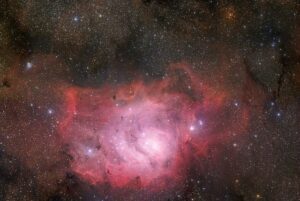
Nebula – Image by WikiImages from Pixabay
Alan Sandridge – the winner of the Crafoord Prize in Astronomy (equivalent to the Nobel Prize for Physics), noted,
I find it quite improbable that such order came out of chaos. There has to be some organizing principle. God to me is a mystery but in the exploration for the miracle of existence, why there is something instead of nothing.
Robert Griffiths who won the Dannie Heineman Prize for Mathematical Physics noted,
If we need an atheist for a debate, I go to the philosophy department. The physics department isn’t much use.
Robert Jastrow, a self-proclaimed agnostic, describes what has happened to his colleagues as they investigate the universe,
For the scientist who has lived by his faith in the power of reason, the story ends like a bad dream. He has scaled the mountains of ignorance; he is about to conquer the highest peak; as he pulls himself over the final rock, he is greeted by a band of theologians who have been sitting there for centuries.
Fine Tuning Inference Among Astronomers
Astronomers are up to date on the fine-tuning of the universe and its inferences to design can refute the claim that the universe appears to have been made by a Designer.
The appearance of fine-tuning and inference for design is just so overwhelming.
Every year, there are more discoveries that demonstrate the exquisitely fine detail of everything throughout the Universe including the Universe itself, matter, galaxies, stars, planets, interstellar density, water, chemicals, atoms, subatomic particles, quantum physics, to name a few.
The evidence is so overwhelming as to be irrefutable.
The Personality of the Creator
Interestingly, it is possible to derive several characteristics for the proposed designer from what we know about the universe in general.
One characteristic is that the Designer seems to be very interested in his Creation and care for living things. We know that since the Creator made matter and time – he must be outside of matter and time. Of course, the Creator has to be ver power and of supreme intelligence.
But what is particularly interesting is the size of the Universe – why is it so big? We estimate there are about a hundred-billion-trillion stars in the universe – why are there so many?
It turns out there had to be a huge amount of stars so that the universe functions correctly. It is important so that during a very brief moment in time, there could be intelligent life somewhere.
This is due to the need for a precise amount of baryons – namely, the protons and neutrons from which all of us are made.
The baryon density determines how efficiently nuclear physics takes place. The amount of stars spread across the universe makes a certain average density of baryons. It turns out that this needed to be an exact number so that during the first few minutes of the universe’s existence the correct amount of deuterium would be made.
If the baryon density were too small, then there would be too little deuterium and helium made that the heavier elements could not form in stars.
Alternatively, if the baryon density were too large in those first few moments, then there would be too much deuterium and helium made and the stars would burn much too quickly and life could again – not form.
This means the average density of matter throughout the universe has to be just right.
Atheist Responses to Religious Belief
Atheists find themselves in a difficult situation when trying to explain the universe. The inference for design is so strong – and getting stronger – than it is obvious to an impartial scientist. Of course, it is then up to the scientist to determine how to interpret this obvious inference for design.
Some hope to escape this inference through appeals to a multiverse with an infinite time while other arguments have recently been forthcoming. We will examine these arguments in other articles.
Summary
The steady progress of science in many disciplines including astronomy, biology, chemistry, archaeology among others continues to demonstrate increasing evidence for design.
This is a particular problem for the non-theist who wishes to avoid mention of metaphysical ideas in science.
If the opposite situation were true, that is, if continued discoveries showed no inference toward design and decreasing need for God in an explanatory sense, then cosmologists could reasonably claim that more time is needed for more discoveries.
However, this does not appear to be the case. Instead, the passage to time moves to increasing evidence for design – not decreasing. The more we learn, the more complexity is demonstrating resulting in increasing difficulty to explain the universe through natural means.
We look forward to future discoveries of the next few decades to add to the design inference and greater difficulty for the atheist option.

